Papers by Flavia Candusso
O presente texto traz os resultados de uma pesquisa quantitativa/qualitativa realizada com bolsis... more O presente texto traz os resultados de uma pesquisa quantitativa/qualitativa realizada com bolsistas PIBID e alunos/as de licenciatura em musica da EMUS/ UFBA. A proposta foi conhecer e analisar os contextos culturais de socializacao/ formacao, a fim de discutir a sua presenca no contexto da atuacao pedagogica, em especial em escolas publicas em bairros populares perifericos. Os resultados do levantamento e das analises pautadas na bibliografia especializada atestam a necessidade de continuas discussoes e revisoes conceituais para estimular novas propostas de acao e insercao, tambem a partir de dialogos com a etnomusicologia e suas varias abordagens de diversidade cultural.
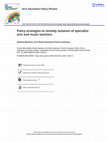
Specialist arts and music teachers around the world experience intense feelings of professional i... more Specialist arts and music teachers around the world experience intense feelings of professional isolation. Such feelings lead to negative consequences on their professional growth, psychological well-being, and ultimately student learning. It is therefore urgent to identify and implement effective policies to foster collegial support and networked learning among these teaching professionals, as well as collaboration with other stakeholders. After reviewing the literature of teacher isolation, the article presents four sections. The first one focuses on the important role that formal (top-down) school-university partnerships may play in remediating teacher isolation. The "Institutional Program for Pre-Service Teachers Education" (IPPSTE), implemented by the Brazilian Federal Government since 2009, is used to illustrate how arts and music teachers can effectively benefit from collaborating face-to-face with student teachers, teacher educators, and researchers. In the second section, online and blended Professional Development (PD) carried out in countries such as the United States, Singapore and Germany are used to show the potential of informal (bottom-up) initiatives, which allow arts and music teachers to interact not only with their peers, but also with teachers specialized in other subjects, PD providers, and professional associations. The third section recommends policies to enhance arts and music teacher PD at large, and in particular the research-practice-policy pipeline. We argue that policies should focus on actionable knowledge within shared spaces and ecological frameworks of learning. The article concludes by proposing additional examples of anti-isolationist policies in arts and music education.
ICTUS - Periódico do PPGMUS-UFBA | ICTUS Music Journal, 2020
O Programa de Pós-Graduação em Música - PPGMUS-UFBA, face à despedida ao Prof. Jamary Oliveira ve... more O Programa de Pós-Graduação em Música - PPGMUS-UFBA, face à despedida ao Prof. Jamary Oliveira vem, através da memória da sua coordenação, prestar um preito de gratidão e reconhecimento pelas inúmeras e imensas contribuições deste eminente professor ao programa e à formação em Música no Brasil.
Problems in Music Pedagogy is an international refereed journal concerned with all aspects of mus... more Problems in Music Pedagogy is an international refereed journal concerned with all aspects of music pedagogy. Topic areas include music teaching/learning process in a new education paradigm context, music learning outcomes, assessment in music pedagogy process, music teaching and learning activities, music teacher competence in the context of sustainable development, music education institutional responses to current trends. The journal is committed to promoting excellence in these fields by providing an international forum for the debate and evaluation of a wide range of music pedagogy issues and professional concerns. The journal aims to publish articles which will contribute to improving theory and practice in the field of music pedagogy.
Arts Education Policy Review
Arts Education Policy Review
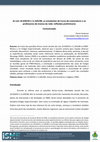
Anais da CONFERÊNCIA REGIONAL LATINO-AMERICANA DE EDUCAÇÃO MUSICAL da ISME, 2017
Resumo: Ao tratar das questões étnico-raciais através das Leis 10.639/03 e 11.645/08 no PIBID-Mús... more Resumo: Ao tratar das questões étnico-raciais através das Leis 10.639/03 e 11.645/08 no PIBID-Música e no Estágio Supervisionado, observei que o assunto sempre gera reações diversas: animação, desconforto, interesse, questionamentos. O objetivo desse texto, portanto, é discutir as experiências realizadas tendo como referencial teórico as publicações da SECADI/MEC, Munanga (2005), Gomes (2003) e os próprios trabalhos acadêmicos produzidos pelos bolsistas PIBID e/ou estudantes do Curso de Licenciatura em Música da UFBA. Do ponto de vista metodológico, trata-se de um relato de experiência que leva em conta vários momentos como as reuniões gerais do PIBID-Música, a orientação e acompanhamento das aulas de Estágio Supervisionado e do mestrado, bem como trabalhos acadêmicos derivados das discussões e atividades. Como resultado dessas reflexões é possível apontar a necessidade de realizar pesquisas para conhecer a visão dos professores e dos estudantes, e a partir dos resultados obtidos, planejar intervenções e cursos de formação continuada. Palavras chave: Leis 10.639/03 e 11.645/08, música afro-brasileira e indígena, PIBID. Introdução Durante os últimos anos as questões étnico-raciais, abordadas através das Leis 10.639/03 e 11.645/08, têm se tornado uma parte central dos momentos de estudo, discussão, planos de intervenção e de atividades no PIBID, foram temas abordados nos 4 semestres da disciplina Estágio Supervisionado 1 , bem como na orientação de alguns trabalhos de mestrado. Embora este tema seja de meu interesse há um certo tempo, começou a reverberar também entre boa parte dos estudantes, muitos deles/as negros/as, que já vivenciaram muitas situações 1 No curso de Licenciatura da Escola de Música da UFBA, os estudantes precisam cursar quarto semestres de Estágio Supervisionado. Os primeiros dois são voltados para observação/monitoria e os últimos dois para regência de classe. No primeiro semestre, que é centrado no universo escolar, as questões ligadas à educação para as relações étnico-raciais entram no estudo das Leis 10.639/03 e 11.645/08 e os principais documentos elaborados pela SECADI/MEC. No segundo, cuja atenção é voltada para as várias formas de ensinar e aprender música além da escola, as discussões levam também em consideração os processos de ensino e aprendizagem da música afro-baiana, afro-brasileira, e indígena, principalmente de contextos de tradição oral.
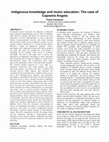
Proceedings of the 29th ISME World Conference
In Brazilian music education, the influences of Western music education methodologies such as tho... more In Brazilian music education, the influences of Western music education methodologies such as those of Willems, Orff, Dalcroze, Kodaly, and Suzuki are still present. The importance of these methodologies to music education history is unquestionable, however, other music learning and teaching systems used in different settings such as popular cultures should also be considered and studied. Therefore, studies of indigenous (popular culture) knowledge can be important because they tend to question the status quo, open new perspectives, and provide a rethinking of the absolute value given to academic knowledge. The aim of this paper was to discuss the importance of indigenous knowledge in music education from the perspective of Capoeira Angola, an expression of Afro-Brazilian culture that incorporates music, fight, dance, play, philosophy, theatre, and traditional costumes. The research method consisted of a case study in a qualitative framework. The study pointed out some interesting aspects concerning the music teaching and learning process: Elder masters and ancestors are constantly honored through music; children learn according to their individual pace, capacity, and motivation; knowledge is transmitted by the master, but also through an interactive process, where, someone who knows something, teaches it to the other members of the group; there is little separation between adults' and children's activities; learning is an interactive performance experience and occurs mostly through non-verbal communication, by participant observation, and is practice-oriented; beginners often share activities with experienced Capoeira masters, learning directly from them the highest standards of Capoeira Angola traditions, values, and behaviors; the human being is holistically conceived with no hierarchical separation between body, mind and spirit. Results show that Capoeira Angola can contribute significantly to music education on different levels: from the conception and planning of lessons, to institutional curriculum, or to public policy for music/arts, and culture. In terms of indigenous musical knowledges, Capoeira Angola, through its Afro-Brazilian values, showed its integration with life, the human being, and the community. Through a contextualized understanding of local musical realities, indigenous knowledge can open new horizons of reflections and practice for music education.
Thesis by Flavia Candusso
Esportivo de Capoeira Angola e pelos grandes ensinamentos sobre a capoeira, sobre uma nova maneir... more Esportivo de Capoeira Angola e pelos grandes ensinamentos sobre a capoeira, sobre uma nova maneira de pensar o tempo e sobre a vida. Minha eterna gratidão pela colaboração, pela parceria, pela disponibilidade, pela amizade e energia positiva, que caracterizaram todas as minhas passagens pelo CECA e qualquer outro momento.
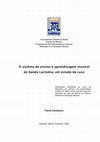
Esta pesquisa procurou estudar o sistema de ensino e aprendizagem musical da banda Lactomia, conj... more Esta pesquisa procurou estudar o sistema de ensino e aprendizagem musical da banda Lactomia, conjunto percussivo originário do bairro do Candeal de Salvador composto por crianças e adolescentes que tocam instrumentos musicais construídos com materiais reciclados. O objetivo dessa investigação é compreender o sistema de ensino e aprendizagem musical, visando focalizar quais objetivos, valores e normas o fundamentam; se há planejamento; qual a metodologia utilizada; e, como é realizada a
avaliação. O propósito é verificar se os elementos que formam o currículo, entendido segundo uma concepção tradicional (objetivos, planejamento, metodologia e avaliação), podem ser também encontrados no sistema de ensino e aprendizagem da banda Lactomia. Esta investigação utiliza como metodologia o estudo de caso dentro de uma abordagem qualitativa. A descrição e análise dos dados evidenciaram que o sistema de ensino e aprendizagem musical da banda Lactomia é fundamentado por objetivos, valores e normas; costuma planejar suas ações e atividades; utiliza uma metodologia baseada na imitação e observação e concebe a avaliação como instrumento para verificar se os resultados de
determinadas ações e atividades refletem os objetivos e valores, bem como se o planejamento e a metodologia escolhida foram adequadas. O sistema de ensino e aprendizagem musical da banda Lactomia resulta constar de um currículo metafórico.
This dissertation aims to study the musical teaching and learning system of the Lactomia Band, a percussive group of the Candeal area of Salvador, whose members, mainly children and teenagers, play on self-built musical instruments made of recycled materials. Aim of this research is to understand if in this teaching and learning system there are objectives, values, rules; activity planning; methodology and assessment, so to verify if curriculum components are present in the musical teaching and learning system of the Lactomia Band as well. This investigation uses a case study method in a qualitative
perspective. The description and analysis of the collected data show that in the musical teaching and learning system of the Lactomia Band exist objectives, values and rules; actions and activities are usually planned; the methodology most used is observation and imitation; and, assessment aims verify if the outcomes reflect objectives, values and if the planning and methodology chosen were appropriate as well. It results that the musical teaching and learning system of the Lactomia Band is based on a metaphorical curriculum.






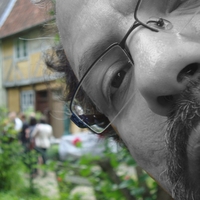




Uploads
Papers by Flavia Candusso
Thesis by Flavia Candusso
avaliação. O propósito é verificar se os elementos que formam o currículo, entendido segundo uma concepção tradicional (objetivos, planejamento, metodologia e avaliação), podem ser também encontrados no sistema de ensino e aprendizagem da banda Lactomia. Esta investigação utiliza como metodologia o estudo de caso dentro de uma abordagem qualitativa. A descrição e análise dos dados evidenciaram que o sistema de ensino e aprendizagem musical da banda Lactomia é fundamentado por objetivos, valores e normas; costuma planejar suas ações e atividades; utiliza uma metodologia baseada na imitação e observação e concebe a avaliação como instrumento para verificar se os resultados de
determinadas ações e atividades refletem os objetivos e valores, bem como se o planejamento e a metodologia escolhida foram adequadas. O sistema de ensino e aprendizagem musical da banda Lactomia resulta constar de um currículo metafórico.
This dissertation aims to study the musical teaching and learning system of the Lactomia Band, a percussive group of the Candeal area of Salvador, whose members, mainly children and teenagers, play on self-built musical instruments made of recycled materials. Aim of this research is to understand if in this teaching and learning system there are objectives, values, rules; activity planning; methodology and assessment, so to verify if curriculum components are present in the musical teaching and learning system of the Lactomia Band as well. This investigation uses a case study method in a qualitative
perspective. The description and analysis of the collected data show that in the musical teaching and learning system of the Lactomia Band exist objectives, values and rules; actions and activities are usually planned; the methodology most used is observation and imitation; and, assessment aims verify if the outcomes reflect objectives, values and if the planning and methodology chosen were appropriate as well. It results that the musical teaching and learning system of the Lactomia Band is based on a metaphorical curriculum.
avaliação. O propósito é verificar se os elementos que formam o currículo, entendido segundo uma concepção tradicional (objetivos, planejamento, metodologia e avaliação), podem ser também encontrados no sistema de ensino e aprendizagem da banda Lactomia. Esta investigação utiliza como metodologia o estudo de caso dentro de uma abordagem qualitativa. A descrição e análise dos dados evidenciaram que o sistema de ensino e aprendizagem musical da banda Lactomia é fundamentado por objetivos, valores e normas; costuma planejar suas ações e atividades; utiliza uma metodologia baseada na imitação e observação e concebe a avaliação como instrumento para verificar se os resultados de
determinadas ações e atividades refletem os objetivos e valores, bem como se o planejamento e a metodologia escolhida foram adequadas. O sistema de ensino e aprendizagem musical da banda Lactomia resulta constar de um currículo metafórico.
This dissertation aims to study the musical teaching and learning system of the Lactomia Band, a percussive group of the Candeal area of Salvador, whose members, mainly children and teenagers, play on self-built musical instruments made of recycled materials. Aim of this research is to understand if in this teaching and learning system there are objectives, values, rules; activity planning; methodology and assessment, so to verify if curriculum components are present in the musical teaching and learning system of the Lactomia Band as well. This investigation uses a case study method in a qualitative
perspective. The description and analysis of the collected data show that in the musical teaching and learning system of the Lactomia Band exist objectives, values and rules; actions and activities are usually planned; the methodology most used is observation and imitation; and, assessment aims verify if the outcomes reflect objectives, values and if the planning and methodology chosen were appropriate as well. It results that the musical teaching and learning system of the Lactomia Band is based on a metaphorical curriculum.